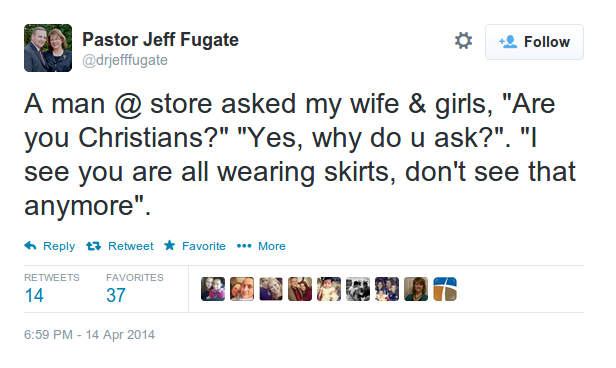
Last week fundamentalist pastor and writer Jeff Amsbaugh created a stir with his article entitled “Keeping Young Fundamentalists In The Camp.” In this article Jeff opines that the reason young fundamentalists are fleeing from the IFB movement is due to the inability of fundamentalists to draw a distinction between mainstream fundamentalism and the “lunatic fringe” which is defined by its perpetual scandals and its pursuit of ever-stricter standards. He then takes on the issues of hyper-separation, pastor worship, isolationism, standards, and pride.
I’ve seen many people both in and outside of fundamentalism who are pleased with Amsbaugh’s article because they see it as a sort of Agrippian Declaration: “almost thou persuadest me to be a [mainstream] Christian.” To be sure it is refreshing to see any kind of indictment against the IFB movement from one of their own instead of the usual response of Deny, Deflect, and Defend.
Yet, for all that Jeff has written here there remain three unanswered questions that will determine whether or not this article is effective or just so much more noise.
1. Who are these “normal” fundamentalists?
If we’re going to try to draw lines between mainstream fundamentalism and the “lunatic fringe” in trying to keep young fundamentalists “in the camp” then it’s important to define exactly which camp they should stay in. As fundamentalism shrinks, the lines are growing increasingly blurry between the fringe and the supposed middle.
BJU now has speakers on its platform that are also welcomed at Hyles-Anderson. West Coast administrators like Paul Chappell (for whom Jeff Amsbaugh writes) are also making the journey to the Fundamentalist Mecca in Hammond, Indiana. Sword of the Lord conferences are full of the very worst of fundamentalism who are roundly embraced by those we’re told are reasonable. Tony Hutson is still out there being paid to prance and scream at churches; so is John Hamblin. And so are many, many others of their ilk. Can anybody point me to the border between “Normal Fundyland” and “Crazy Town”? Does one even exist?
Since nobody seems to be able to tell exactly where the crazy stops and normalcy begins, every fundamentalist who reads this article can heartily agree with the notion that “lunatics are bad.” As long as each person ascribes to some other group the title of “lunatic fringe” then nothing has to change. Which, I suspect, is rather the point.
2. What causes the lunacy?
It’s all well and good to point out that there are abuses, sex scandals, ridiculous standards, and the glorification of pastors to the point of idolatry but if you’re not going be honest about the root cause of these problems then you can’t possibly hope for positive change.
Here’s the truth: when you centralize the power in one man and isolate your congregation from the world outside then abuses inevitably follow within a generation. We’ve seen this model since days of J. Frank Norris and down through the next generations. If fundamentalism keeps doing the same things they cannot possibly hope for a different result.
Amsbaugh pays lip service to the notion that “We have met the enemy, and he is us.” If he really believed that then what would be the result?
3. What is the call to action?
I’ve sat in Jeff Amsbaugh’s former church and listened to him speak. In those sermons I’ve heard him give a very clear call to action for some wrong that he thought needed to be addressed. In fact, one Father’s Day I heard him preach an entire sermon from a text on the Crucifixion about turning our backs on our children and abandoning them if they insist on living in sin. His point was wrongheaded and his exegesis was abysmal and yet nobody there that day could say he wasn’t clear in his call to action. In this article, however, it remains unclear exactly what needs to be done to fix fundamentalism.
His big finish ends with “God help us to keep the baby but get rid of the bath water, for the bath water is indeed dirty.” I suppose we can then add “keep on keeping on” and “stick by the stuff” and a thousand other platitudes and powerless cliches.
I challenge Jeff to name the names of who the crazies are instead of just alluding to their misdeeds. Let him tell us that he will no longer attend conferences or be part of associations where these people are honored. Let us hear him say that he will practice his own standard of separation against actual evil instead of against the bugaboos of Calvinism and beer and then I believe that he may be part of a camp that young fundamentalists may find worth staying in.
Until then, I hope to see both young and old fundamentalists fleeing as if their lives depended on it. The truth is that their souls very well may.




